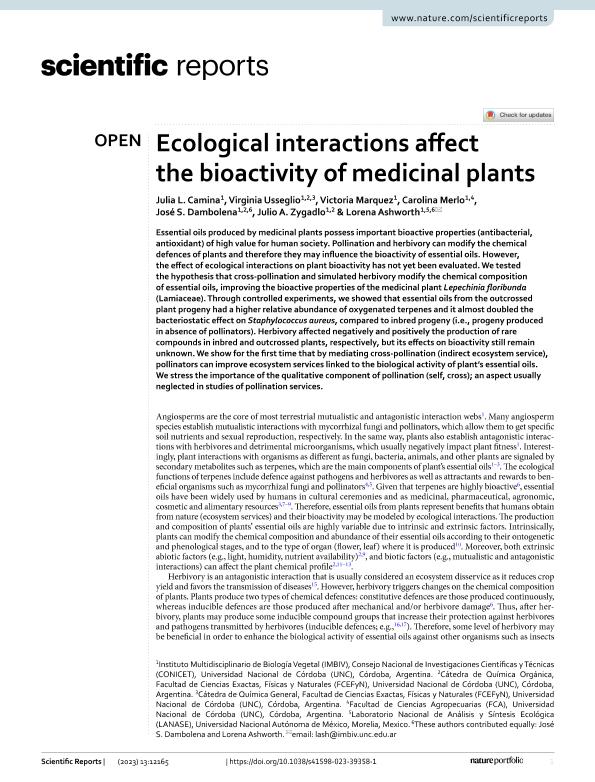Artículo
Ecological interactions affect the bioactivity of medicinal plants
Camina, Julia Laura ; Usseglio, Virginia Lara
; Usseglio, Virginia Lara ; Marquez, Victoria
; Marquez, Victoria ; Merlo, Carolina
; Merlo, Carolina ; Dambolena, José Sebastián
; Dambolena, José Sebastián ; Zygadlo, Julio Alberto
; Zygadlo, Julio Alberto ; Ashworth, Lorena
; Ashworth, Lorena
 ; Usseglio, Virginia Lara
; Usseglio, Virginia Lara ; Marquez, Victoria
; Marquez, Victoria ; Merlo, Carolina
; Merlo, Carolina ; Dambolena, José Sebastián
; Dambolena, José Sebastián ; Zygadlo, Julio Alberto
; Zygadlo, Julio Alberto ; Ashworth, Lorena
; Ashworth, Lorena
Fecha de publicación:
12/2023
Editorial:
Nature Research
Revista:
Scientific Reports
e-ISSN:
2045-2322
Idioma:
Inglés
Tipo de recurso:
Artículo publicado
Clasificación temática:
Resumen
Essential oils produced by medicinal plants possess important bioactive properties (antibacterial, antioxidant) of high value for human society. Pollination and herbivory can modify the chemical defences of plants and therefore they may influence the bioactivity of essential oils. However, the effect of ecological interactions on plant bioactivity has not yet been evaluated. We tested the hypothesis that cross-pollination and simulated herbivory modify the chemical composition of essential oils, improving the bioactive properties of the medicinal plant Lepechinia floribunda (Lamiaceae). Through controlled experiments, we showed that essential oils from the outcrossed plant progeny had a higher relative abundance of oxygenated terpenes and it almost doubled the bacteriostatic effect on Staphylococcus aureus, compared to inbred progeny (i.e., progeny produced in absence of pollinators). Herbivory affected negatively and positively the production of rare compounds in inbred and outcrossed plants, respectively, but its effects on bioactivity still remain unknown. We show for the first time that by mediating cross-pollination (indirect ecosystem service), pollinators can improve ecosystem services linked to the biological activity of plant’s essential oils. We stress the importance of the qualitative component of pollination (self, cross); an aspect usually neglected in studies of pollination services.
Palabras clave:
POLLINATION QUALITY
,
INBREEDING
,
BIOACTIVITY
,
ECOSYSTEM SERVICES
,
TERPENES
Archivos asociados
Licencia
Identificadores
Colecciones
Articulos(IMBIV)
Articulos de INST.MULTIDISCIPL.DE BIOLOGIA VEGETAL (P)
Articulos de INST.MULTIDISCIPL.DE BIOLOGIA VEGETAL (P)
Citación
Camina, Julia Laura; Usseglio, Virginia Lara; Marquez, Victoria; Merlo, Carolina; Dambolena, José Sebastián; et al.; Ecological interactions affect the bioactivity of medicinal plants; Nature Research; Scientific Reports; 13; 1; 12-2023; 1-10
Compartir
Altmétricas



